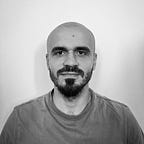Your Belief is Not the Truth
I am reminded of something one of my masters in my spiritual search, Mooji, said. He used was a painter and he used to be obsessed with the idea of creating the ultimate painting. One night, he said, he dreamed that he finally did it. Only that, when he looked at it, this paining was ever moving, ever changing. This painting was not static. It was not dead, it was a living organism.
It was only recently that it became clear to me that this applied to truth. That truth, the ultimate truth, God, the ground of all being, cannot have a fixed, static and bounded existence. That if he was absolute and absolutely true, he could not be confined to and contained in any system, image or belief structure. And if in any way you are to encounter God, it will have to be through a temporary slit in your experience; any slit. It could be in church, it could be in prison, in a brothel, in a bar, as you are walking through the depths of the hell of your life…
Now, the issue arises when man tries to make this experience permanent, to capture it in words, in an image, in memory. It is like drawing a circle on the surface of the ocean. For how long will the same water stay there? But people would like to make this feeling of meeting God, of witnessing the Transcendent a permanent state of affairs. And that’s why they write religious books, build institutions, preach, do militant missionary work… All this is nothing but an attempt to catch the ocean in a plastic bottle. As soon as the water gets inside the bottle and is sealed with a cap, it stops being the ocean and, after some time, it will become stale and stinky. That’s what happened with man’s multitude of religions and beliefs.
You may agree with me when I speak of religious beliefs in this manner, thinking of yourself to be non-religious, but you’re not out of the equation. Any belief you cherish and try to keep is like ocean water left in a plastic bottle; stale and stinky.
Truth becomes doctrine when the history of your experience becomes more important than the effects, the changes it produced in your life. God-Experience comes to you in a particular form because you were sensitive to that particular form at that moment in time. The form is not the point. The experience is not the point, even. But the point is the transformation that occurs in you as a result of the experience.
Ok, another ocean analogy. Imagine a surfer. He ‘catches’ a wave and the wave drags him along for the ride. He may think that he is riding the wave. Now, because he enjoyed the ride so much, he decides to capture that very wave so that he and others can ride it in the future. Let’s say he somehow manages to capture it in a large enough container. When he goes and looks inside the container, to his surprise, he cannot see the wave. All he sees is inert water. Leave it there for long enough and it’s gonna smell like a dead fish.
This story may sound ridiculous when you hear it being said about a surfer, about something so concrete to the eye. The difficulty comes to us when we are dealing with more abstract stuff. When we’re faced with things that we can’t see, the issue becomes harder to recognise, but by no means impossible, thanks to the grace of the living Life, of the great ocean that can still give you a splash to wake up.
Your forming of a belief is just an attempt of deadening the world, of killing it because you are afraid of its aliveness. You are scared of its fullness and unpredictability so you want to kill it, render it immovable. It is easier to deal with a lifeless, putrid fish than with a living being. But the lifeless fish stinks. And if you get rid of life’s unpredictability, you also get rid of pleasant surprises and so you dismiss any opportunity for growth.
